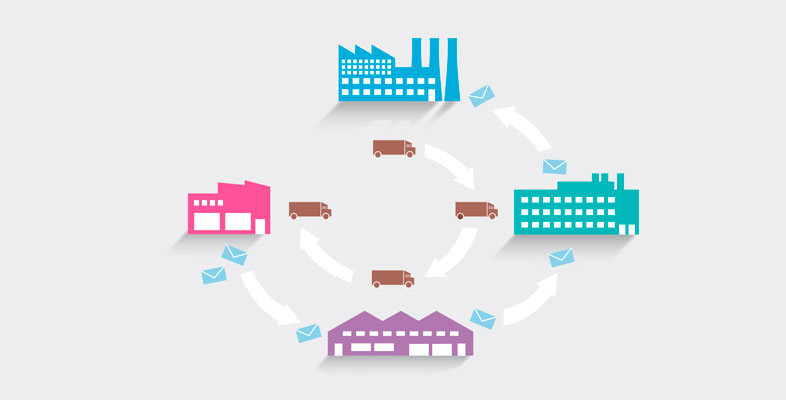The role of ERP systems in improving supply chain and inventory management in companies.
Enterprise Resource Planning (ERP) systems are essential tools that help companies improve supply chain and inventory management. By providing a comprehensive and integrated view of all business operations, ERP systems can enhance efficiency, reduce costs, and boost competitiveness in the market.

In the modern business world, supply chain management and inventory management are crucial factors that contribute to the success or failure of companies. With the increasing complexities of global markets and rising customer expectations, it has become necessary for companies to adopt advanced technological solutions to enhance their performance. This is where the importance of Enterprise Resource Planning (ERP) systems comes in, providing companies with the necessary tools to improve their operations in innovative and efficient ways.
ERP systems offer a comprehensive and integrated view of all business operations, allowing companies to monitor and manage all aspects of the supply chain from raw material sourcing to final product delivery. By improving coordination between different departments and enhancing information flow, ERP systems can reduce operational costs, increase efficiency, and achieve customer satisfaction.
Furthermore, ERP systems play a pivotal role in inventory management, helping to monitor inventory accurately and avoid shortages or excess stock. With advanced analytical capabilities, companies can more accurately forecast demand and make informed decisions about inventory procurement and management. In this way, ERP systems contribute to improving overall company performance and enhancing its competitiveness in the market.
Improving Supply Planning
Enterprise Resource Planning (ERP) systems play a crucial role in enhancing supply planning within companies. Supply planning is an essential part of the supply chain, requiring precise coordination between various departments to ensure the availability of raw materials and necessary components in the right quantities and at the right time. ERP systems enable companies to efficiently manage this process by providing a comprehensive and integrated view of all supply stages.
ERP systems help in gathering and analyzing data from various departments, such as:
- Purchasing: Tracking orders and contracts with suppliers easily.
- Production: Providing accurate insights into material needs and production scheduling.
- Sales: Assisting in demand forecasting and inventory level control.
With these systems, companies can:
- Develop accurate and executable supply plans: Avoiding supply gaps that may lead to production halts or delivery delays.
- Improve communication between suppliers and companies: Enhancing negotiation capabilities and improving contract terms.
- Monitor supplier performance continuously: Using extracted data to make informed decisions regarding enhancing supplier relationships or seeking new partners.
By improving supply planning using Enterprise Resource Planning (ERP) systems, companies can achieve higher operational efficiency, cost reduction, and increased customer satisfaction.
Improving Collaboration with Suppliers and Partners
Enterprise Resource Planning (ERP) systems are vital tools that contribute to improving collaboration with suppliers and partners in business. Effective collaboration with suppliers and partners enhances operational efficiency, reduces costs, and increases customer satisfaction. By using ERP systems, companies can achieve better communication and more effective management of relationships with suppliers and partners.
Here's how ERP systems contribute to improving collaboration:
- Enhancing Information Exchange: ERP systems provide a centralized platform for collecting and exchanging information between companies and suppliers. This helps in providing accurate and real-time data about inventory levels, purchase orders, and shipment status.
- Promoting Transparency: With a comprehensive and integrated view of company operations, ERP systems improve transparency in business processes, contributing to building trust between companies and suppliers.
- Accelerating Processes: Through automating many processes such as purchase order processing and shipment tracking, ERP systems reduce the time spent on these operations, leading to faster collaboration and improved efficiency.
- Improving Demand Forecasting: Thanks to advanced analytical capabilities provided by ERP systems, companies can forecast demand more accurately, helping to avoid inventory shortages or excess and ensuring availability of products when needed.
- Contract Management and Effective Negotiation: ERP systems provide tools for contract management and performance tracking, making it easier to negotiate with suppliers and improve contract terms.
By using Enterprise Resource Planning (ERP) systems, companies can build stronger and more sustainable relationships with suppliers and partners, enhancing their ability to respond to market changes and achieve sustainable competitive advantage.
Reducing Supply Costs
Enterprise Resource Planning (ERP) systems play a vital role in reducing supply costs for companies. By providing a comprehensive and integrated view of business operations, ERP systems help companies improve resource management and reduce waste, resulting in significant cost savings.
Here's how ERP systems contribute to reducing supply costs:
- Inventory Management Improvement: ERP systems allow companies to monitor inventory levels accurately and avoid shortages or excess stock. This helps in reducing storage costs and costs associated with retaining excess inventory.
- Enhancing Procurement Processes: Through automating procurement processes, ERP systems can reduce the time and costs associated with preparing and processing purchase orders. These systems also facilitate negotiations with suppliers to obtain the best prices and terms.
- Increasing Operational Efficiency: Thanks to integration between various departments and functions within the company, ERP systems help improve workflow and reduce the time required to execute operations, leading to lower operational costs.
- Reducing Human Errors: By automating processes and improving data accuracy, ERP systems help reduce human errors that may lead to additional costs.
- Improving Demand Forecasting: ERP systems contribute to improving demand forecasting accuracy, helping companies organize supplies more efficiently and avoid costs associated with inventory shortages or excess products.
- Enhancing Supplier Relationships: By providing a centralized platform for information exchange and analyzing supplier performance, ERP systems improve relationships with suppliers, leading to improved terms and reduced costs.
Using Enterprise Resource Planning (ERP) systems, companies can achieve greater efficiency in supply management, directly contributing to cost reduction and profitability enhancement.
Data Analysis and Forecasting
Enterprise Resource Planning (ERP) systems play a crucial role in data analysis and forecasting, significantly contributing to improving company performance and making informed decisions. By providing advanced analytical tools, ERP systems enable companies to collect, process, and analyze large amounts of data from various departments, helping to improve forecasts and strategic planning.
Here's how ERP systems contribute to data analysis and forecasting:
- Centralized Data Collection: ERP systems provide a centralized database that gathers data from all company departments, such as sales, procurement, production, and human resources. This integration helps in obtaining a comprehensive and accurate picture of the company's overall performance.
- Real-Time Data Analysis: ERP systems enable real-time data analysis, helping to quickly discover trends and patterns and make fast decisions based on accurate information.
- Demand Forecasting: Thanks to advanced analytical capabilities, ERP systems improve the accuracy of demand forecasting for products and services. This helps in organizing inventory levels and planning production more efficiently.
- Identifying Opportunities and Challenges: ERP systems analyze data to identify new market opportunities and potential challenges. This allows companies to develop suitable strategies for growth and overcoming obstacles.
- Supplier Performance Analysis: ERP systems provide tools for evaluating supplier performance and analyzing supply-related data, helping to improve supplier relationship management and select the best performers based on actual performance.
- Customized Reports: ERP systems allow for the creation of customized reports that meet management needs, aiding in performance monitoring and more effective result analysis.
By using Enterprise Resource Planning (ERP) systems, companies can enhance their capabilities in data analysis and forecasting, leading to improved strategic planning, increased operational efficiency, and gaining a competitive advantage in the market.
Improving Shipping and Distribution Processes
Enterprise Resource Planning (ERP) systems are vital tools for enhancing shipping and distribution processes within companies. By providing an integrated platform to manage all aspects of the supply chain, ERP systems help improve operational efficiency, reduce costs, and enhance customer satisfaction.
Here's how ERP systems contribute to improving shipping and distribution processes:
- Data Integration: ERP systems offer seamless data integration across various departments, helping improve coordination between shipping, distribution, and inventory management processes. This ensures accurate and up-to-date information availability for all stakeholders.
- Routing Planning and Optimization: ERP systems enable companies to efficiently plan shipping routes using accurate data about demand, inventory, and geographical locations. These routes can be optimized to reduce transportation costs and delivery times.
- Real-Time Shipment Tracking: ERP systems provide tools for real-time shipment tracking, assisting companies in monitoring shipment status and managing risks related to delays or lost shipments.
- Precise Inventory Management: By continuously monitoring inventory levels, ERP systems improve restocking processes and ensure the availability of required products without shortages or excess. This helps reduce costs associated with inventory storage and transportation.
- Enhanced Customer Service: With the ability to track shipments and manage orders efficiently, companies can enhance customer service levels by providing accurate and updated information about order status and delivery expectations.
- Performance Analysis and Reporting: ERP systems offer analytical tools to evaluate the performance of shipping and distribution operations, aiding in identifying weaknesses and suggesting necessary improvements. Customized reports can be prepared to provide accurate insights into operational efficiency.
By using Enterprise Resource Planning (ERP) systems, companies can significantly improve shipping and distribution processes, leading to reduced operational costs, increased efficiency, and improved customer satisfaction by providing reliable and effective shipping and distribution services.
I-ZONE: Improving Business Operations through CodeZone's Enterprise Resource Planning System
I-ZONE is an integrated Enterprise Resource Planning (ERP) system offered by CodeZone, specifically designed to meet the needs of companies of all sizes and industries. I-ZONE aims to enhance operational efficiency and overall performance by providing advanced tools for resource integration and management.
Here are some key features and how companies benefit from I-ZONE:
- Comprehensive Data Integration: I-ZONE provides a central platform for collecting and integrating data from all company departments, including sales, finance, human resources, and production. This integration helps provide a comprehensive and accurate view of overall performance, contributing to informed decision-making.
- Inventory Management Improvement: I-ZONE enables precise monitoring of inventory levels, helping avoid shortages or excess stock. The system can forecast future needs and efficiently plan restocking, reducing storage costs and increasing efficiency.
- Data Analysis and Forecasting: I-ZONE offers advanced analytical tools for collecting and analyzing data from various departments. Companies can use these tools to improve demand forecasting accuracy and identify opportunities and challenges, enhancing strategic planning.
- Enhancing Collaboration with Suppliers and Partners: With an integrated platform for information exchange and supplier performance analysis, I-ZONE enhances effective collaboration with suppliers and partners. Companies can improve contract terms and negotiate better based on accurate and reliable data.
- Process Automation: By automating many administrative and routine processes, I-ZONE helps reduce human errors and increase operational efficiency. This allows employees to focus on more important and strategic tasks.
By using I-ZONE, companies can achieve comprehensive digital transformation, contributing to overall performance improvement and increased competitiveness in the market. With the flexibility and power offered by this system, companies can efficiently and effectively achieve their goals.
Conclusion
Amidst the increasing challenges faced by companies in global markets, the need for advanced technological solutions becomes more critical than ever. Enterprise Resource Planning (ERP) systems play a crucial role in improving operational efficiency, reducing costs, and enhancing competitiveness. By providing a comprehensive and integrated view of operations, improving supply chain planning, enhancing collaboration with suppliers, accurate data analysis, and facilitating shipping and distribution processes, these systems enable companies to significantly improve their performance.
The I-ZONE system offered by CodeZone is a prominent example of how ERP technologies can be effectively applied to achieve these objectives. With its advanced capabilities in data integration, inventory management, shipping process improvement, and data analysis, I-ZONE can help companies achieve comprehensive digital transformation and enhance their ability to adapt to market changes.
In summary, ERP systems are vital tools that companies must adopt to ensure success and sustainability in the contemporary business world. By leveraging advanced solutions like I-ZONE, companies can achieve higher operational efficiency, increase customer satisfaction, and gain a sustainable competitive advantage.


